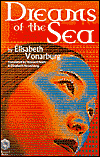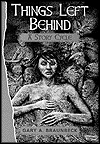
Dreams of the Sea, by Elisabeth Vonarburg
Book Review by Matt Hughes
Have you read this book?
This is a book of dreams, in both a literary and a literal sense. Its creation began back in 1966 when a teenaged Frenchwoman who was just beginning to write science fiction recorded a Big Meaningful Dream. She wrote only two lines in her diary: "A huge planet, entirely covered twice a year by a universal tide, during a universal eclipse, but nobody dies."
Thirty years later, the young Frenchwoman had long since transplanted herself to Québec and become one of Canada's most revered science fiction writers, with over thirty awards in France, Canada and the US, including the 1993 Philip K. Dick Special Award. And the Big Meaningful Dream had become the Tyranaël Saga, a five-volume epic published in French whose first installments is now appearing in English.
It is a multi-generational tale about the human colonization of one of the twin planets orbiting Altair. The first colonists, fleeing an Earth devastated by man-made disasters, establish their bases and begin to explore the empty and abandoned -- yet completely intact -- cities of the world's vanished inhabitants.
Then comes the eclipse. During the violet tinged darkness a vast, glowing Sea rises up along the world's coastlines, submerging the land under a blue tide that dissolves living tissue and cancels all electromagnetic energies. The bases are drowned, the shuttles crash, the survivors regroup and struggle on, awaiting the next shipment of frozen pioneers from Earth.
Thus summarized, Dreams of the Sea might sound like your typical planetary colonization yarn, out of Shakespeare's The Tempest by way of Forbidden Planet. But as the Bard said, there's a rub, and it's an intriguing one: the story is told in fragments that capture episodes in the lives of the colonists as the generations pile up and they adjust to the regular inundations. The fragments themselves are not chosen for recounting by an anonymous narrator; instead they are the Dreams of Eïlai Liannon Klaïdaru, one of Tyranaël's vanished inhabitants, a cat-eyed species, some of whom are chosen for training in recondite psychic arts.
Of all Tyranaël's Dreamers, only Eïlai Dreams of the Strangers, as the Earthers are called: of Timmi, the little boy who sees the Sea coming; of Ti-Jean Carigan, the adventurer who changed his name to put a teenage murder behind him; of Shandaar the eminent archaeologist, confined to a madhouse by the colonial authorities lest he disturb the comfortable consensus about the nature of the Sea.
The Sea is the elephant in the living room, the great unavoidable fact of life on Tyranaël that the colonists nonetheless elect not to notice. For it is not actually a sea; that is merely the word they have affixed to it, although it's true that you can sail a boat on it, sometimes. Yet after generations on the world, with the Sea regularly coming and going, no one knows what it is, nor where it comes from, nor where it goes. Is it a kind of energy that no instrument can register? Is it an entity, sentient or not? Is it even *there* at all, or merely an effect on human senses?
There may come answers to these and other questions as the five-volume saga rolls on; indeed, I would be surprised if there weren't. But perhaps only mildly surprised. For this is not a linear narrative, progressing stolidly from beginning to middle to end. It is a series of trips into the Dreamtime. As Eïlai calls up Dreams of the Strangers and of her own folks, events and characters emerge as if in a literal dream, rising up out of the unconscious to act their parts and speak their lines, then fading as another series of players arrive to strut and fret.
The over-all effect is dreamlike. It lends to the story an aura of *mystery* in the old sense of the word, of deeper realities that can only be guessed at in the shapes of what we see and hear and touch. The writing, too, helps create and sustain the dreaming mood; it is both lush and distant, rich and cool at the same time. I often felt I was hearing echoes of Ursula K. LeGuin's felicitous touch with a descriptive phrase.
One minor irritant: in places the translation fails. For example, the French word "comme" translates into English as either "like" or "as" and the two are not interchangeable in usage. But in this translation, it's always "like." I wouldn't ordinarily make this quibble, but the author herself is listed on the cover as one of the translators.
Still, such small glitches aside, Dreams of the Sea is a powerful rendering of story as dream and of dream as story. I will be most interested to see where it goes.
Thirty years later, the young Frenchwoman had long since transplanted herself to Québec and become one of Canada's most revered science fiction writers, with over thirty awards in France, Canada and the US, including the 1993 Philip K. Dick Special Award. And the Big Meaningful Dream had become the Tyranaël Saga, a five-volume epic published in French whose first installments is now appearing in English.
It is a multi-generational tale about the human colonization of one of the twin planets orbiting Altair. The first colonists, fleeing an Earth devastated by man-made disasters, establish their bases and begin to explore the empty and abandoned -- yet completely intact -- cities of the world's vanished inhabitants.
Then comes the eclipse. During the violet tinged darkness a vast, glowing Sea rises up along the world's coastlines, submerging the land under a blue tide that dissolves living tissue and cancels all electromagnetic energies. The bases are drowned, the shuttles crash, the survivors regroup and struggle on, awaiting the next shipment of frozen pioneers from Earth.
Thus summarized, Dreams of the Sea might sound like your typical planetary colonization yarn, out of Shakespeare's The Tempest by way of Forbidden Planet. But as the Bard said, there's a rub, and it's an intriguing one: the story is told in fragments that capture episodes in the lives of the colonists as the generations pile up and they adjust to the regular inundations. The fragments themselves are not chosen for recounting by an anonymous narrator; instead they are the Dreams of Eïlai Liannon Klaïdaru, one of Tyranaël's vanished inhabitants, a cat-eyed species, some of whom are chosen for training in recondite psychic arts.
Of all Tyranaël's Dreamers, only Eïlai Dreams of the Strangers, as the Earthers are called: of Timmi, the little boy who sees the Sea coming; of Ti-Jean Carigan, the adventurer who changed his name to put a teenage murder behind him; of Shandaar the eminent archaeologist, confined to a madhouse by the colonial authorities lest he disturb the comfortable consensus about the nature of the Sea.
The Sea is the elephant in the living room, the great unavoidable fact of life on Tyranaël that the colonists nonetheless elect not to notice. For it is not actually a sea; that is merely the word they have affixed to it, although it's true that you can sail a boat on it, sometimes. Yet after generations on the world, with the Sea regularly coming and going, no one knows what it is, nor where it comes from, nor where it goes. Is it a kind of energy that no instrument can register? Is it an entity, sentient or not? Is it even *there* at all, or merely an effect on human senses?
There may come answers to these and other questions as the five-volume saga rolls on; indeed, I would be surprised if there weren't. But perhaps only mildly surprised. For this is not a linear narrative, progressing stolidly from beginning to middle to end. It is a series of trips into the Dreamtime. As Eïlai calls up Dreams of the Strangers and of her own folks, events and characters emerge as if in a literal dream, rising up out of the unconscious to act their parts and speak their lines, then fading as another series of players arrive to strut and fret.
The over-all effect is dreamlike. It lends to the story an aura of *mystery* in the old sense of the word, of deeper realities that can only be guessed at in the shapes of what we see and hear and touch. The writing, too, helps create and sustain the dreaming mood; it is both lush and distant, rich and cool at the same time. I often felt I was hearing echoes of Ursula K. LeGuin's felicitous touch with a descriptive phrase.
One minor irritant: in places the translation fails. For example, the French word "comme" translates into English as either "like" or "as" and the two are not interchangeable in usage. But in this translation, it's always "like." I wouldn't ordinarily make this quibble, but the author herself is listed on the cover as one of the translators.
Still, such small glitches aside, Dreams of the Sea is a powerful rendering of story as dream and of dream as story. I will be most interested to see where it goes.
| Dreams of the Sea, by Elisabeth Vonarburg on Amazon |
Dreams of the Sea, by Elisabeth Vonarburg on Amazon

Comment on Dreams of the Sea, by Elisabeth Vonarburg
| Comments on Dreams of the Sea, by Elisabeth Vonarburg |
| There are no comments on this book. |



